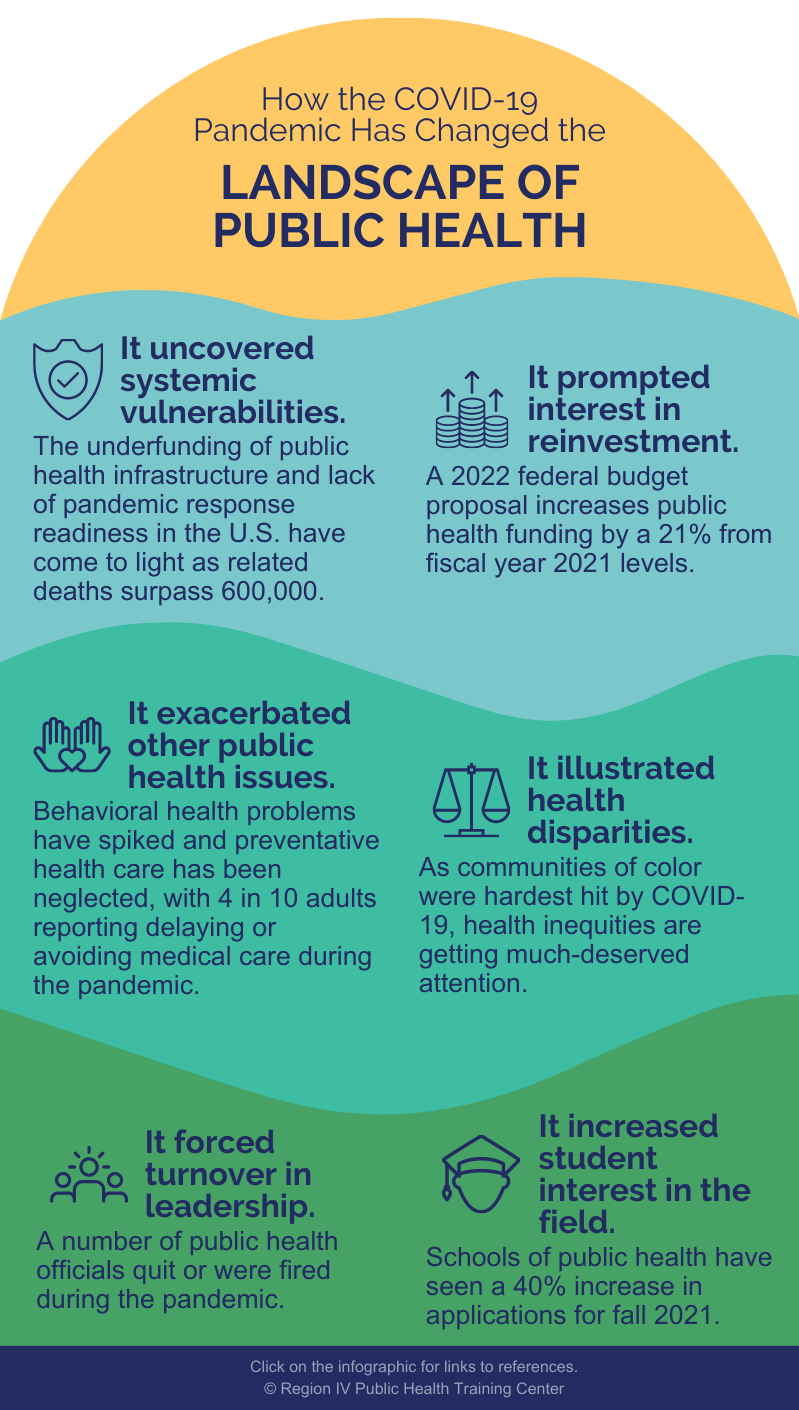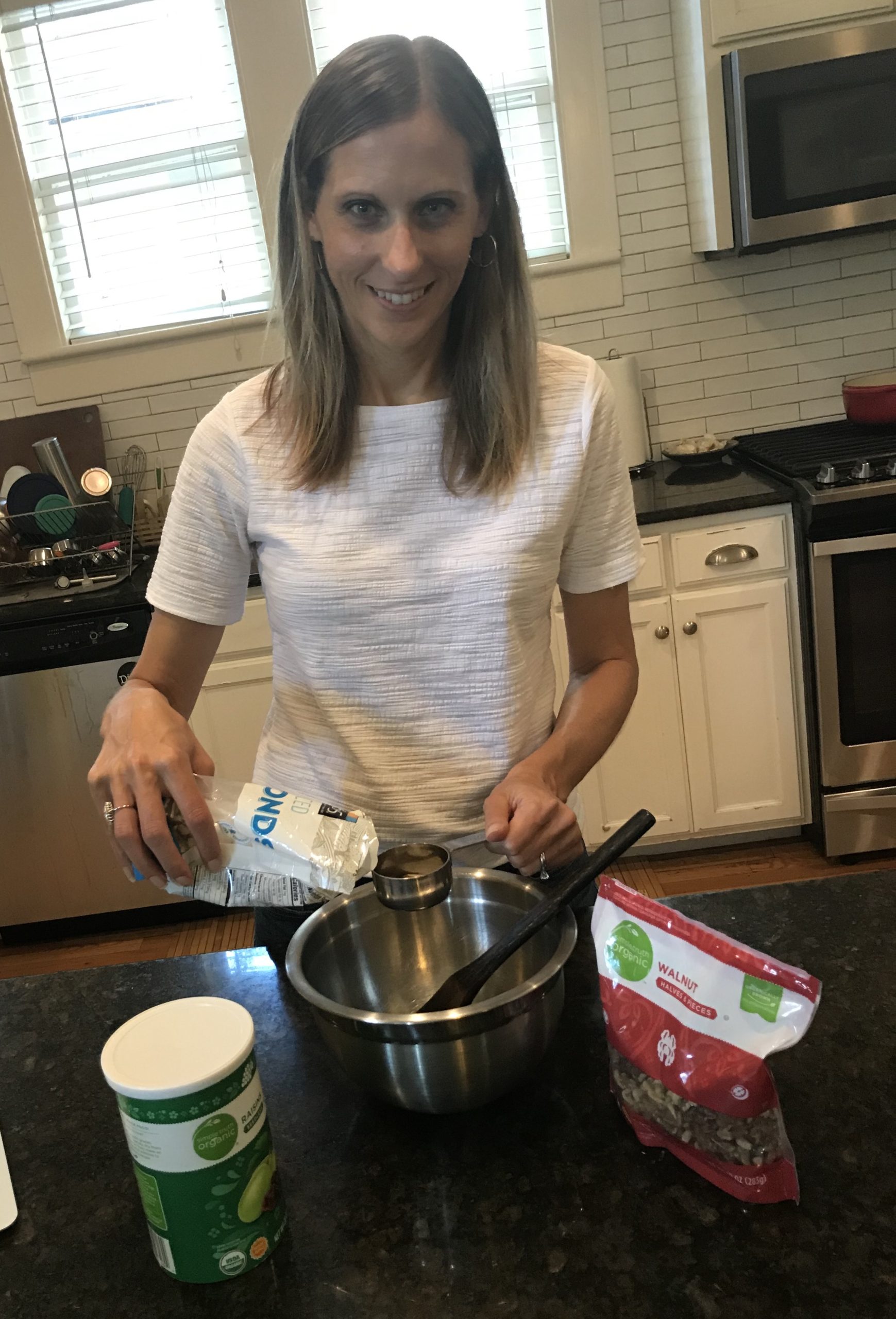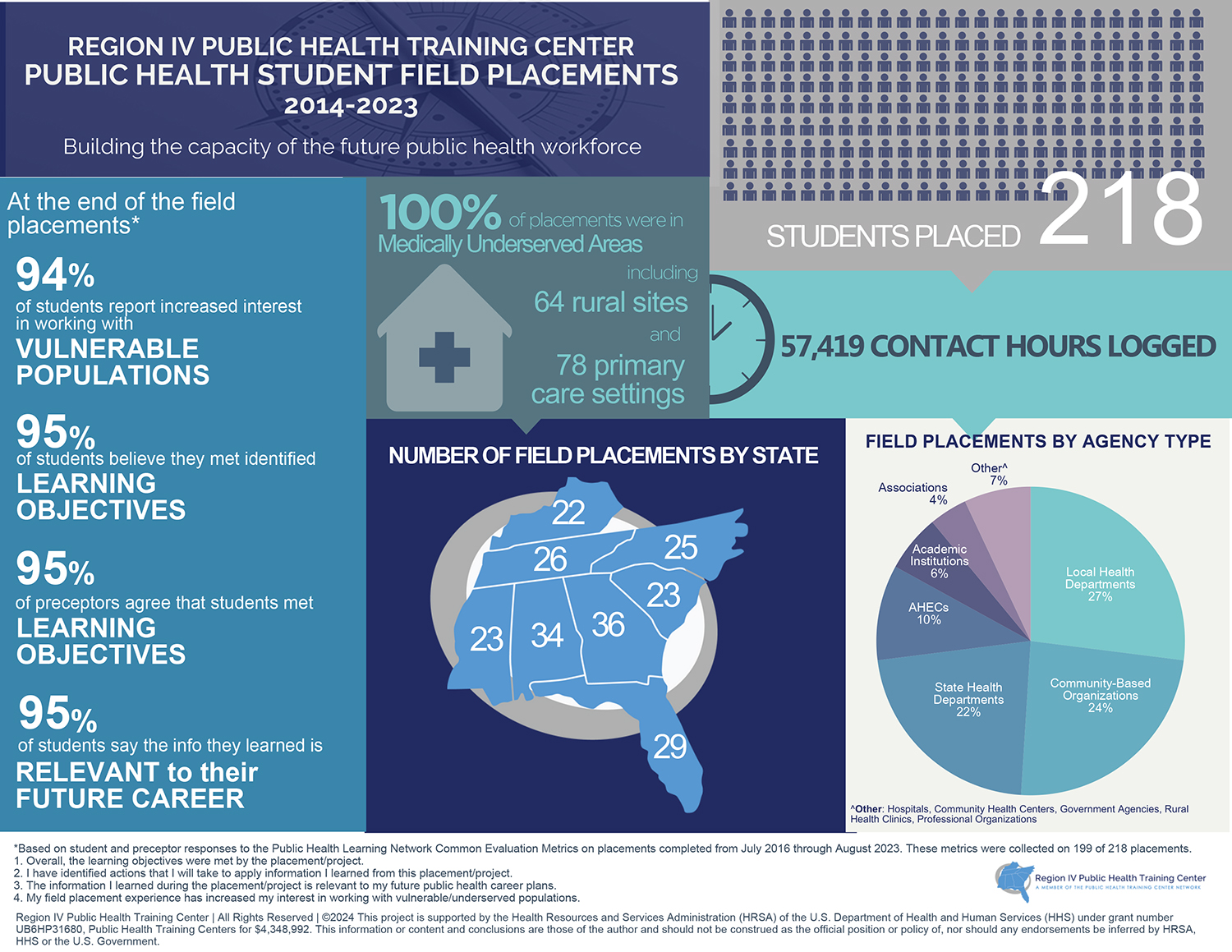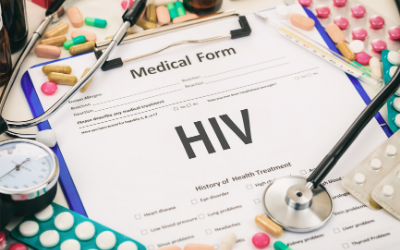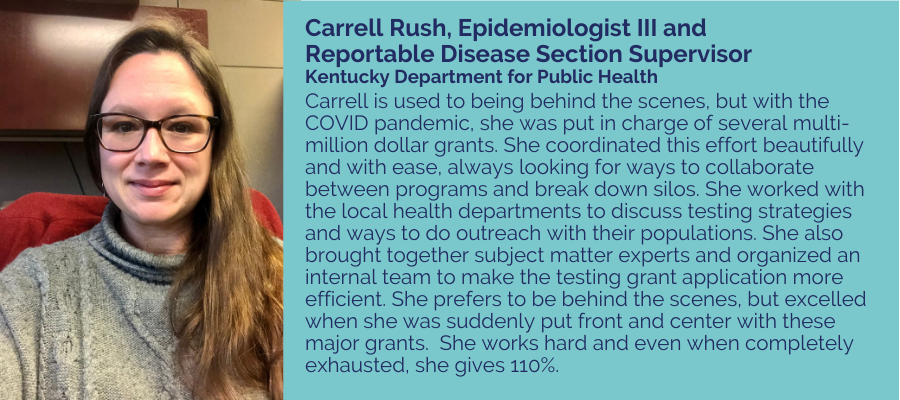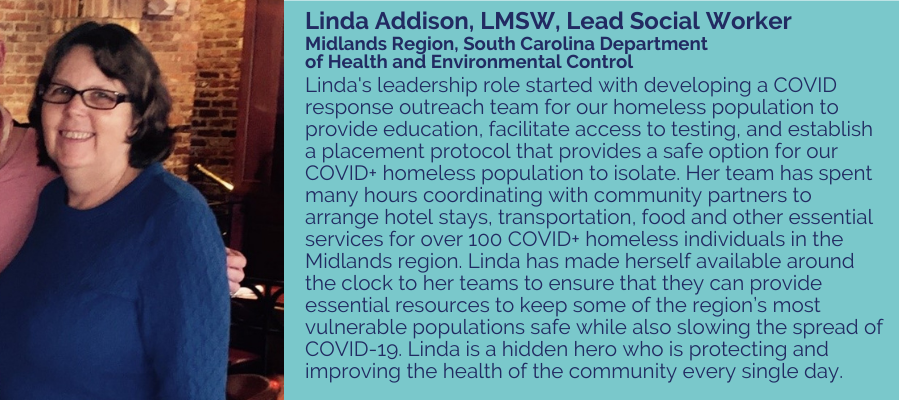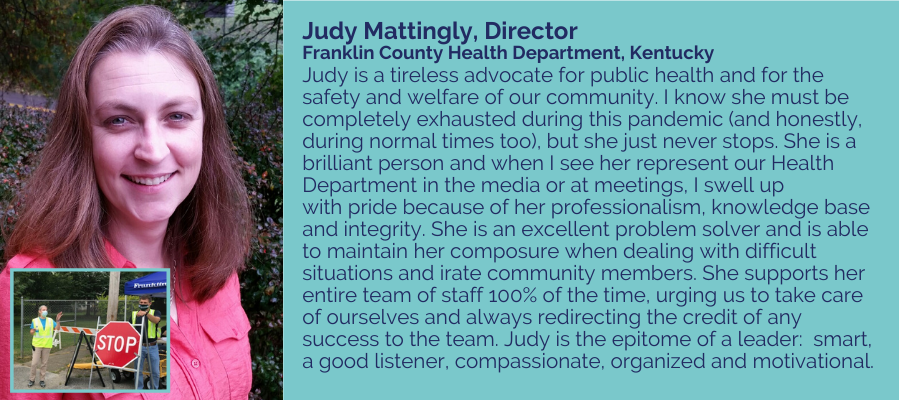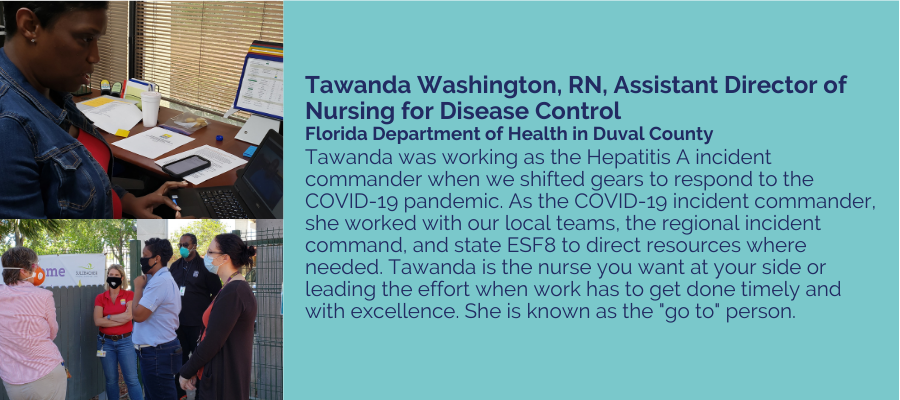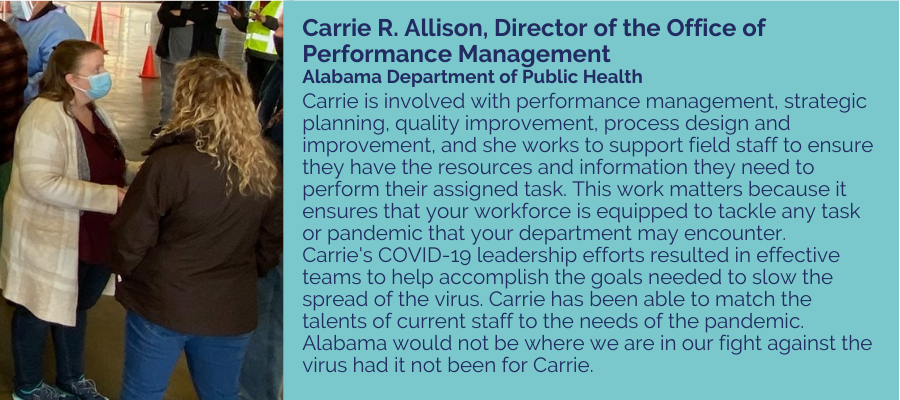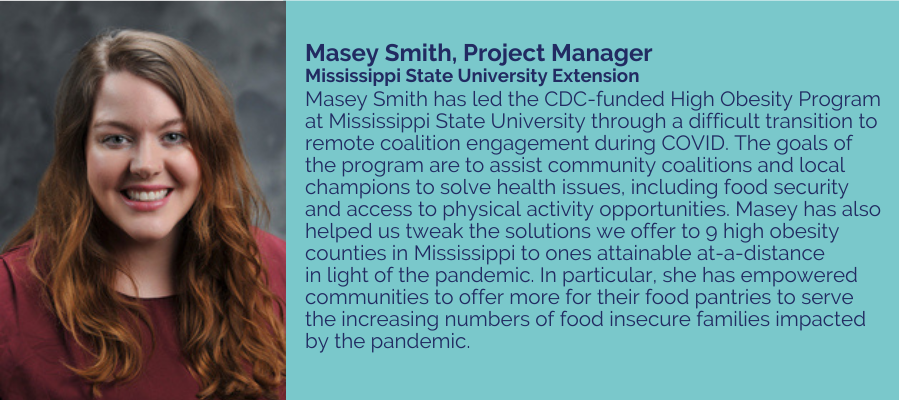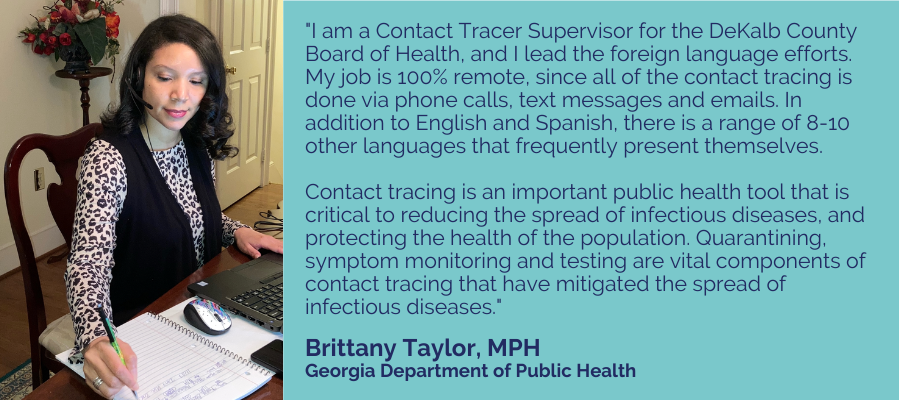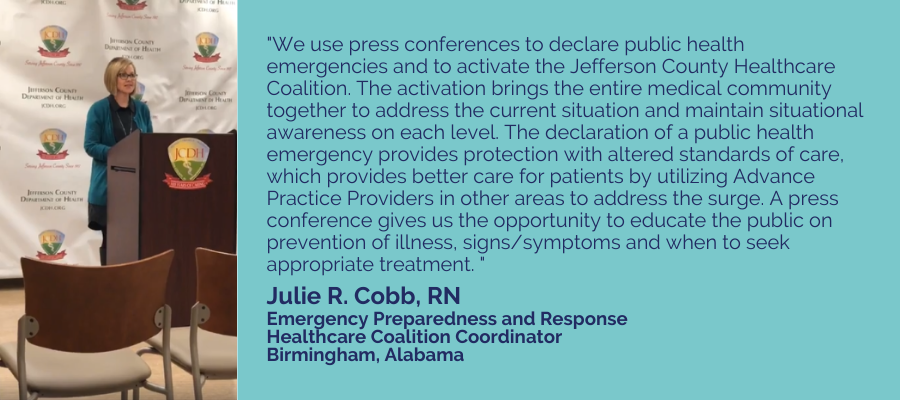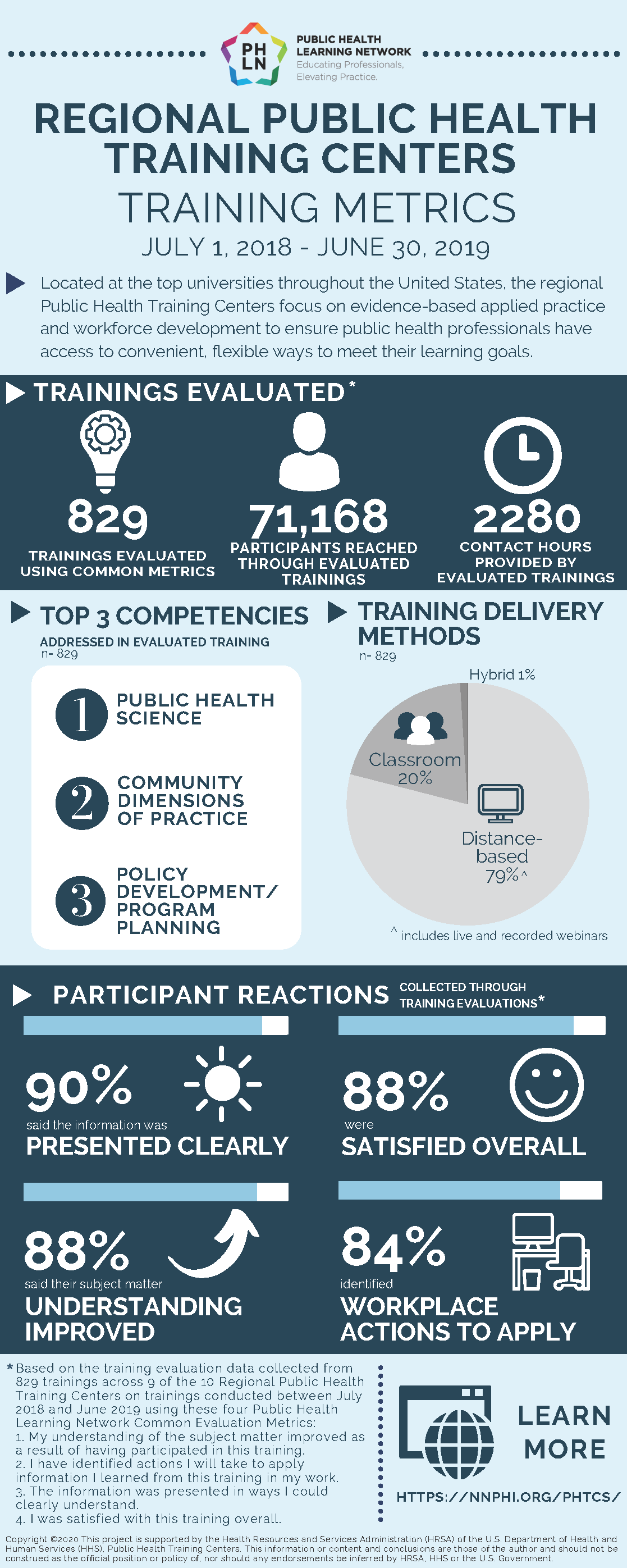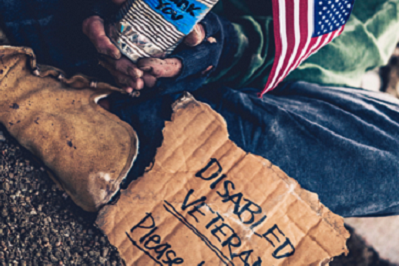
by R-IV PHTC | May 1, 2022 | Training
Homelessness and Health among Veterans
Year: 2022 | Competency/Strategic Skill: N/A | Priority Topic: N/A | Setting: Online | Format: On-Demand | Sponsor: Emory University/Central Office
In Overview:
This is a 90-minute recording of a live webinar from May 24, 2022 from 12 – 1:30 pm ET.
Veterans experience higher rates of both homelessness and suicide compared with their non-Veterans peers. In addition, Veterans experiencing adverse social determinants of health—such as homelessness—are at increased risk of suicide and other poor health outcomes. In this webinar, Dr. Ann Elizabeth Montgomery, Associate Professor at the UAB School of Public Health, will explore the concept of homelessness and housing instability generally and experiences among Veterans specifically. We will discuss how homelessness is defined and enumerated, pathways into homelessness, trajectories of homelessness, and multi-level interventions to prevent and end homelessness. We will also explore the intersection among homelessness (and other adverse social determinants of health), Veterans’ use of tailored services to address these needs, and their experience of particular health conditions and outcomes, including suicide ideation, attempt, and death.
By the end of this webinar you will be able to:
-
-
Describe the experience of homelessness among Veterans.
-
Identify interventions to prevent and end homelessness among Veterans.
-
Describe the association between the use of tailored services to address adverse social determinants of health and Veterans’ risk of suicide mortality.

by R-IV PHTC | Apr 11, 2022 | Training
Scientific Reporting During a Pandemic: A Conversation with Katherine Wu
Year: 2022 | Competency/Strategic Skill: Communication | Priority Topic: N/A | Setting: Online | Format: Live | Sponsor: Emory University/Central Office, University of Alabama at Birmingham
Overview:
This is a recording of the live webinar scheduled for May 11, 2022 at 12PM CT.
During the COVID-19 pandemic, media outlets have been tasked with translating complex and evolving scientific data about the nature and risks of SARS-CoV-2 to the public. Journalists in these roles have had to stay up to date with rapidly evolving information, wade through misinformation, scrutinize data, and amplify voices from underrepresented and marginalized communities at unprecedented speed to keep the public informed. In this webinar, Dr. Katherine Wu, a staff writer at The Atlantic, joins us for a conversation about her experience, challenges, and lessons learned while reporting on the COVID-19 pandemic.
This webinar is co-sponsored by Alabama Regional Center for Infection Prevention and Control Training and Technical Assistance and the Region IV Public Health Training Center.

by R-IV PHTC | Mar 30, 2022 | Featured Training, Training
Professional Growth through Public Speaking: Increasing Your Presentations Skills for Career Success
Year: 2022 | Competency/Strategic Skill: Communication | Priority Topic: N/A | Setting: Online | Format: On-demand | Sponsor: Emory University/Central Office
Overview:
This is a recording of a webinar held on March 22, 2022.
This session, featuring Gillian Landgraff, Senior Learning Consultant, Learning & Organizational Development, Emory University, is designed to introduce proven techniques to demonstrate confidence when speaking publicly, describe components of an effective presentation, recognize common errors in the use of A/V equipment, PowerPoint, and props, and identify ways to assess and gain control of the audience. Session discussions will focus on preparing participants with presentation techniques and the do’s and don’ts of being an effective presenter. By examining their skill gaps and opportunities for growth, participants can enhance presentation skills for career success. Participants will leave this session with strategies to build their skillsets to deliver the presentations with confidence while captivating the audience!
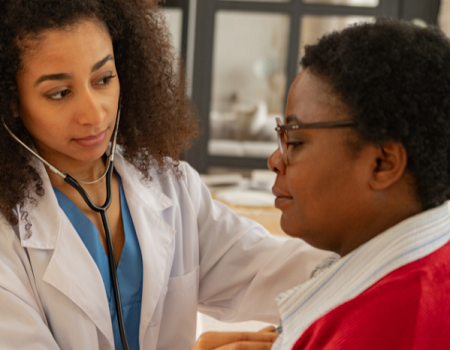
by R-IV PHTC | Mar 18, 2022 | Training
Improving Lung Health of Patients with Sickle Cell Disease (SCD): Alabama Perspective
Year: 2022 | Competency/Strategic Skill: Public Health Fundamentals | Priority Topic: N/A | Setting: On-line | Format: On-demand | Sponsor: Alabama Public Health Training Network
Overview:
This is a live webinar on April 13, 2022 from 12:00 pm – 1:30 pm CT
Sickle Cell Disease (SCD) is the most common life-shortening autosomal recessive disorder that predominantly affects African Americans. Alabama has one of the highest rates of SCD according to the CDC. Acute Chest Syndrome (ACS) is the most common cause of death in children with Sickle Cell Disease (SCD) and accounts for 25% of the mortality in SCD. ACS requires admission to the hospital with an average stay of 10 days in children and 13 days in adults. It peaks in childhood, affecting 25.3% of children with a death rate of 1.1% per episode.
In adults, the mortality rate of ACS is even higher at 4.3% per episode. Recurrent ACS leads to pulmonary fibrosis and restrictive lung disease which adds to the morbidity related to SCD and increases the odds of recurrence due to worsened oxygenation. Most of the morbidity and mortality burden of SCD occurs from ACS and other pulmonary complications of SCD such as asthma, pulmonary hypertension, and sleep disordered breathing. There are
promising curative therapies of SCD which should enhance
efforts to maintain lung health in this population.
Learning Objectives
By the end of this training, participants should be able to:
1. List pulmonary complications of sickle cell disease (SCD).
2. Discuss the impact of pulmonary complications on patients with SCD, including patient’s perspectives.
3. Describe efforts to improve the lung health of children with SCD in Alabama using Children’s of Alabama and the University of
Alabama at Birmingham (UAB) as examples.

by R-IV PHTC | Mar 9, 2022 | Featured Training, Training
Misinformation As a Risk Factor During the COVID-19 Pandemic
Year: 2022 | Competency/Strategic Skill: Communication | Priority Topic: N/A | Setting: Online | Format: Live | Sponsor: Emory University/Central Office, University of Alabama at Birmingham
Overview:
This is a recording of the live webinar scheduled for April 26, 2022 at 12PM CT.
Misinformation has been a risk factor throughout the pandemic, leading to more disease and death from COVID-19. Dr. Katrine Wallace (UIC School of Public Health) is an epidemiologist and social media science communicator who debunks misinformation and false claims about COVID-19 and the vaccines. In this talk, she will discuss the difference between misinformation vs disinformation, the techniques that people use to mislead, why misinformation goes so viral on social media, and how viral misinformation is negatively affecting public health.
This webinar is co-sponsored by Alabama Regional Center for Infection Prevention and Control Training and Technical Assistance and the Region IV Public Health Training Center.

by R-IV PHTC | Mar 9, 2022 | Training
Infection Prevention: What Is It? Can It Really Help Protect Us from Pathogens?
Year: 2022 | Competency/Strategic Skill: Public Health Fundamentals | Priority Topic: Other Infectious Diseases | Setting: Online | Format: On-Demand | Sponsor: Emory University/Central Office, University of Alabama
Overview:
This is a recording of a live webinar scheduled for March 22, 2022 at 12PM CT.
The Alabama Regional Center for Infection Prevention and Control Training and Technical Assistance presents “Infection Prevention: What is it? Can it really help protect us from pathogens?”. COVID has reminded us how vulnerable the human race is to pathogens. Infectious disease outbreaks and pandemics are not new. They have helped shape how the human race has evolved and how we live in the world.
In this webinar, Mary Duncan, Senior Director of Infection Prevention at the University of Alabama-Birmingham Health System, will explain what infection prevention is and how it can help protect us from infectious diseases. She will review the evolution of infection prevention and explore key infection prevention measures that are used every day. Participants will also be able to identify potential trends in infection prevention and how these may help protect us from another pandemic. This webinar is co-sponsored by Alabama Regional Center for Infection Prevention and Control Training and Technical Assistance, Region IV Public Health Training Center, and the Deep South Center for Occupational Health and Safety.
This webinar is co-sponsored by Alabama Regional Center for Infection Prevention and Control Training and Technical Assistance, Region IV Public Health Training Center, and Deep South Center for OH&S .
Alabama Nursing CEUs Pending.

by R-IV PHTC | Feb 25, 2022 | Featured Training, Training
Community Assessment: Conducting Surveys
Year: 2021 | Competency/Strategic Skill: Data Analytics and Assessment; Community and Partner Engagement | Priority Topic: N/A | Setting: Online | Format: On-Demand | Sponsor: Emory University/Central Office
Overview:
This is a self-paced online course expected to take 45 minutes to complete.
This course provides an introduction to planning for and conducting community surveys. It introduces concepts and applies knowledge and skills that are essential for planning for and conducting a survey and analyzing and disseminating survey data specifically for the purpose of community assessment. It is an introductory-level course designed to build competence in data analytics and assessment as well as community engagement in public health professionals, especially those in the governmental public health workforce. There are no prerequisites.
The course contains two modules: the content module and an evaluation. After finishing both modules, learners will earn a certificate of completion. When the certificate is available, learners will see a Certificate button on their dashboard.
Participants will need a broadband internet connection (Google Chrome or Mozilla Firefox are preferred browsers) and computer speakers. For technical support, please contact emoryphtc@emory.edu.
About the Course Developers
This course was developed by the Region IV Public Health Training Center at the Emory University Rollins Schools of Public Health. The content was developed by Kirsten Rodgers, EdD, MSPH, MCHES®, Principal and Owner of Proximate Learning.
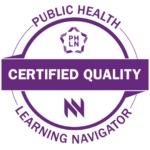

by R-IV PHTC | Feb 25, 2022 | Featured Training, Training
Difficult Dialogues: Learning Effective Communication About Tough Topics
Year: 2022 | Competency/Strategic Skill: Communication | Priority Topic: N/A | Setting: Online | Format: On-demand | Sponsor: Emory University/Central Office, University of Alabama
Overview:
This is a recording of the live webinar scheduled for March 10, 2022 at 12PM CT.
In today’s polarized and increasingly isolated communication landscape it can feel impossible to break through the noise and establish a meaningful dialogue about issues related to the COVID-19 pandemic. In this webinar, Dr. Adam Brooks from the University of Alabama shares with us the basis for effective communication and how to shift tough topics from a debate to a dialogue.
By the end of this webinar you will be able to:
- Identify the techniques of effective communication.
- Break down barriers to arrive at shared understanding.
- Determine the difference between dialogue and debate.
- Apply the four steps of active listening.
- Recognize the barriers put up around complex issues like vaccine.
- Develop strategies to structure conversations for better outcomes.
This webinar is co-sponsored by Alabama Regional Center for Infection Prevention and Control Training and Technical Assistance and the Region IV Public Health Training Center.
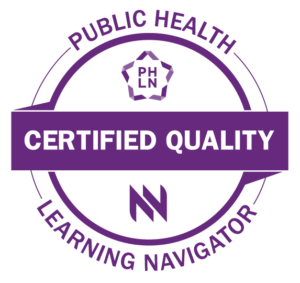
by R-IV PHTC | Feb 23, 2022 | News
R-IV PHTC Trainings Earn Quality Seal
The Learning Navigator Seal is granted to organizations whose trainings have been screened, reviewed, and approved through the Public Health Learning Navigator’s peer Quality Review Process.

by R-IV PHTC | Feb 20, 2022 | Field Placement Stories
Yasmin Goreja was completing her dual masters in public health and social work at the University of Georgia when she served as a Region IV PHTC Pathways to Practice Scholar in the fall of 2021. In her field placement, Yasmin had the opportunity to work with the East Georgia Cancer Coalition (EGCC) to create a new program known as “Love Your Lungs.” This program aims to reduce the prevalence of lung cancer in the region by helping residents quit tobacco through a variety of smoking cessation methods. The program also works to guide healthcare providers with evidence-based resources to assist their patients’ quit attempt. Here is Yasmin’s reflection on her experience in her own words:
The East Georgia Cancer Coalition is an essential asset to the residents of Georgia, especially to individuals who have limited access to cancer-related resources. Creating the Love Your Lungs program has allowed this organization to address a significant, yet under-addressed issue in the state of Georgia and across the coalition region. Moving forward, EGCC should continue to establish the foundation of the program and later expand it to more clinics across the region, especially in rural areas. Going forward, creating a virtual telehealth component of this program could potentially reach a greater target population across the region. Lastly, further research on lung cancer prevalence rates and various demographic tobacco statistics among East Georgia residents is highly recommended to better serve this population.
Working at the East Georgia Cancer Coalition has reaffirmed my belief that access to healthcare is a fundamental right for all individuals. This organization strives to address many cancer-related needs that are often overlooked. Interning here has helped me gain practical experience that I hope to use as a future public health practitioner. The project I worked on allowed me to truly understand tobacco dependence as more than just a “bad habit.” Instead, I learned how addictive nicotine is and how it can chemically alter an individual’s brain, eventually leading to dependence. I hope to continue to use my skills and knowledge on tobacco dependence to spread information to vulnerable populations. EGCC has granted me greater insight into the East Georgia region and its needs, and I am excited to see how the Love your Lungs program continues to unfold.

by R-IV PHTC | Feb 10, 2022 | Training
Epidemiology 101: Fundamental Concepts for Understanding the Pandemic
Year: 2022 | Competency/Strategic Skill: Data Analytics and Assessment | Priority Topic: Other Infectious Disease | Setting: Online | Format: On-demand | Sponsor: Emory University/Central Office and University of Alabama at Birmingham
Overview:
This is a 60-minute recording of a live webinar.
Since the beginning of the COVID-19 pandemic, understanding epidemiologic concepts has become paramount for personal and professional decision-making. This webinar will give you several tools to read and critically think about pandemic-related news. We will explore concepts like herd immunity, vaccine efficacy, and endemic infection, and consider what they mean for COVID-19 control. Finally, we will practice disentangling correlation from causation.
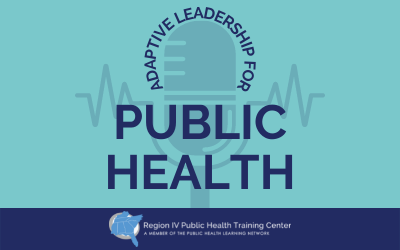
by R-IV PHTC | Dec 2, 2021 | Featured Training, Podcast, Training
Adaptive Leadership for Public Health Podcast Series
Year: 2021 | Competency/Strategic Skill: Leadership and Systems Thinking | Priority Topic: N/A | Setting: Online | Format: On-demand | Sponsor: Emory University/Central Office
Overview:
This is a podcast series with six episodes offered as part of our Leading Public Health podcast. Each episode is about 20 minutes. New episodes are released monthly.
Adaptive Leadership for Public Health is designed to help tier 3 (senior management/executive level) public health professionals address complex challenges by growing and thriving as an adaptive leader.
Episode 1: What is Adaptive Leadership? (available now) Download Transcript
Episode 2: Leadership Principles and Practices (available now) Download Transcript
Episode 3: Cultural Competence (available now) Download Transcript
Episode 4: Managing Conflict (available now) Download Transcript
Episode 5: Collaborative Leadership (available now) Download Transcript
Episode 6: Leading Change (available now) Download Transcript
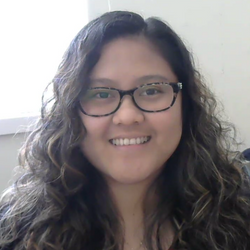
by R-IV PHTC | Dec 2, 2021 | Field Placement Stories
Angela Lupo was a senior at the University of North Carolina Wilmington majoring in Public Health with a concentration of Global Health when she served as a Region IV PHTC Pathways to Practice Scholar in the summer of 2021. In her field placement, Angela worked with the Center for Healthy Communities, also in Wilmington. Here is Angela’s reflection on her experience in her own words:
Center for Healthy Communities captured my interest because of their goals and mission. Because this agency works with the communities, I was exposed to their projects that focused on helping the needs of the communities. I also had a great experience working with this agency’s community partners because they helped me broaden my knowledge and skills especially when communicating with them and with other people. This agency did not disappoint me because by working with them, I gained confidence talking to other people and not hesitant to speak up even though English is not my first language.
During my internship, I learned to developed, implemented, and evaluated a nutrition education program that focused on healthy eating with hydration and the integration of diabetes. I also learned to conduct online research to locate and learn about nutrition programs from different agencies within New Hanover County and the Northside Health & Wellbeing Improvement Team’s partnering agencies. As a future health educator, I valued all the experiences that I had from working with this agency especially when educating the communities and promoting their health. In addition, by working with the Center for Healthy Communities, made me realized all the skills that I need to improve in order for me to be successful when I work at the real world. I believe that all the things that I learned from Center for Healthy Communities will be very helpful to me when I entered the public health world after I graduate at the University of North Carolina Wilmington.

by R-IV PHTC | Nov 15, 2021 | Training
Innovation Approaches to Tackle Public Health and Community Challenges
Year: 2021/2022 | Competency/Strategic Skill: Leadership and Systems Thinking | Priority Topic: N/A | Setting: Online | Format: On-Demand | Sponsor: Emory University/Central Office
Overview:
This is a three-part webinar series; all parts were recorded. These were interactive webinars in which learners engaged with the instructor and other participants. Learners may choose to register for all webinars in the series or for individual sessions.
Systems problems, by definition, are complex and can seem impossible to tackle. However, there are tools and innovative approaches that might help public health professionals and partners make progress on these problems. Join us for a 3-part webinar series to learn tools and approaches for tackling large-scale community challenges, from maternal health to opioid overdoses. In the first webinar, we will cover stakeholder mapping and how understanding the whole ecosystem of players can help you decide who to include in co-creating solutions and what communications approaches to use. The second webinar will cover right-sizing your problem so that you can effectively approach and tackle it. If we don’t break systems problems down into manageable pieces, we often become immobilized by the complexity or risk losing the nuances of the problem. Finally, building off the identified parts of the ecosystem, in the third webinar, we’ll journey map the current, as well as the ideal, situation. From there, we can look at the gaps between the two states and ideate possible solutions.

by R-IV PHTC | Oct 26, 2021 | Training
Using Strategic Messaging and Framing to Motivate Others to Support Public Health
Year: 2021 | Competency/Strategic Skill: Community and Partner Engagement | Priority Topic: N/A | Setting: Online | Format: On-demand | Sponsor: Emory University/Central Office
Overview:
This is a self-paced course. This is the third of three courses on Public Health Reaching Across Sectors (PHRASES).
This course focuses on how to use strategic messaging tools simultaneously with framing tools to motivate cross-sector partners and other non-public health experts to support public health interventions, programs, and policies. The strategic messaging tools that are explored include unique value proposition, narrative structure, one-minute messages, and the public health story map.

by R-IV PHTC | Sep 28, 2021 | Featured Training, Training
Reinvesting in the Health and Wellness of America
Year: 2021 | Competency/Strategic Skill: Resource Management and Financial Planning | Priority Topic: N/A | Setting: Online | Format: On-demand | Sponsor: Emory University/Central Office
Overview:
This is a recording of a webinar held on October 12, 2021.
Dr. William E. Cooke is a physician in a rural, southern Indiana town of Austin, Indiana, and has first-hand knowledge of how the resources and opportunities available to communities impact the health, prosperity, and wellbeing of the people living there. Discrimination and deindustrialization have left pockets of concentrated poverty, toxic stress, and inequity and created health disadvantages for many. Unfortunately, our public health system has not risen to the challenge. In his book, Canary in the Coal Mine: A Forgotten Rural Community, a Hidden Epidemic, and a Lone Doctor Battling for the Life, Health, and Soul of the People, Dr. Cooke discusses these factors and how they came into play in his fight against the opioid epidemic and the worst drug-fueled HIV outbreak ever seen in rural America.
In this webinar and based on his experiences in Austin, Dr. Cooke will discuss the need to reinvest in the health and wellness of America and to build an effective public health system that benefits everyone in the community.

by R-IV PHTC | Aug 16, 2021 | Field Placement Stories
Dawn Mapatano was a Master of Public Health student at Jackson State University with a concentration in Epidemiology when she served as a Region IV PHTC Pathways to Practice Scholar in the fall of 2020. In her field placement, Dawn worked with the West Central Alabama Area Health Education Center (AHEC) to assess opioid use disorder treatment needs. Here is Dawn’s reflection on her experience in her own words:
This field placement appealed to me initially because I saw that they worked with the rural community of southern Alabama and I had not had an opportunity to work with in a rural community because I have always worked and lived in an urban area. Learning that the focus of the activities that I would be working on was the immense issue of opioid addiction and the opioid crisis currently occurring in southern Alabama really intrigued me. I had not previously had the opportunity to work directly on an issue that is domestically centered but also has global ramifications. The survey that our team created to assess the needs of the community is a concept I was familiar with due to the coursework that I have taken as a master’s of public health candidate. It was intriguing to see how something that I had only seen in practice within a global public health context like a need’s assessment was also applicable within a domestic space.
This experience helped me to become more culturally competent because I had to think about an issue that I had no previous experience with. I was tasked with then displaying sensitivity to the people who have been placed in those contexts. In the initial phone calls, I talked to community members who were involved in providing resources for people addicted to opioids. I was able to figure out ways to communicate the reason this grant would also be helpful for the southern Alabama community. Learning to use Qualtrics for the first-time is also a useful skill gained from this experience as I now know how to create surveys and assess and analyze the data that come out of these surveys.

by R-IV PHTC | Jul 8, 2021 | Featured Training, Training
Year: 2021 | Competency/Strategic Skill: Resource Management and Financial Planning | Priority Topic: N/A | Setting: Online | Format: On-demand | Sponsor: Emory University/Central Office
Overview:
This is a two-hour recording of a webinar held on July 15, 2021.
Recent research says that executives average 23 hours per week in meetings and 49% of participants considered unfocused meetings and projects as the biggest workplace time waster and the primary reason for unproductive work days.In this session you’ll learn tactics to reduce meeting attendance and make the meetings you are going to more efficient and (dare we say) more fun. From pre-meeting planning, to structured meeting styles, to post-meeting follow up, participants will do hands-on training that will improve any meeting they are running. Stop steamrollers before they start, draw out the quiet experts in the room, be strategic with your slide deck and keep your agenda on track. By energizing and activating meetings, hopefully we can get out of meetings a little faster and a little happier.
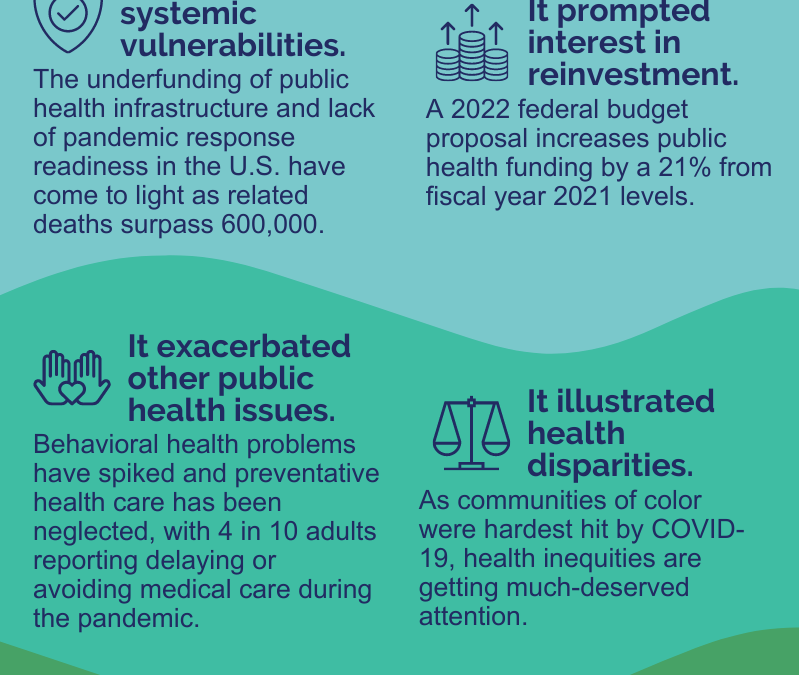
by R-IV PHTC | Jul 1, 2021 | News
From how we work and learn to how we socialize and shop, the COVID-19 pandemic has affected most aspects of our lives as individuals. But how has the pandemic affected the landscape of public health? There’s no shortage of ways—both positive and negative—that the field has been challenged and shaped by the pandemic.

by R-IV PHTC | Jun 24, 2021 | Training
Data Quality and Evidence-based Decision Making in Public Health
Year: 2021 | Competency/Strategic Skill: Data Analytics and Assessment | Priority Topic: N/A | Setting: Online | Format: On-demand | Sponsor: East Tennesee State University
Overview:
This is a self-paced online module.
This video is intended to train the public health workforce by providing information on: 1. Fundamentals of data and data quality. 2. Basic concepts of evidence-based decision making in public health, its relationship with data quality, and some trusted sources of public health evidence.

by R-IV PHTC | Jun 24, 2021 | Training
Public Health Data: A Training for Tier 1 Workforce
Year: 2021 | Competency/Strategic Skill: Data Analytics and Assessment | Priority Topic: N/A | Setting: Online | Format: On-demand | Sponsor: East Tennesee State University
Overview:
This is a self-paced online module.
The manual is designed to fill the gap by providing a course that can be used to train the region’s entry-level or nonsupervisory workforce on different areas of data for decision making, namely, identifying appropriate sources of data and information, collecting valid data, interpreting and using data to address public health issues. The manual has different modules that are intended to be used for each area; while modules can also be omitted or combined for use as needed.

by R-IV PHTC | Jun 24, 2021 | Training
Principles of Data Quality
Year: 2021 | Competency/Strategic Skill: Data Analytics and Assessment | Priority Topic: N/A | Setting: Online | Format: On-demand | Sponsor: East Tennesee State University
Overview:
This is a self-paced online module.
The essence of this training is to enable the public health workforce to manage and interpret data effectively by understanding the core principles of data quality.
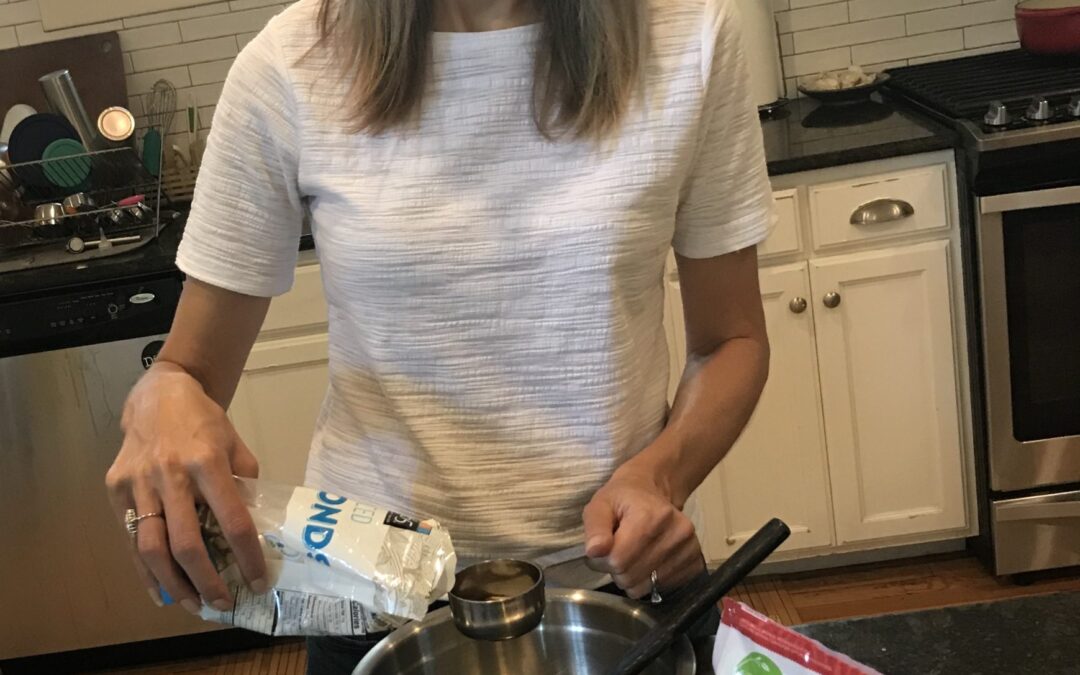
by R-IV PHTC | Jun 21, 2021 | Field Placement Stories
Jennifer Drey was pursuing an Executive Master of Public Health at Emory University when she served as a Region IV PHTC Pathways to Practice Scholar in the fall of 2020. In her field placement, Jennifer was responsible for the development of DASH (Dietary Approaches to Stop Hypertension) diet curriculum for implementation in the Georgia Department of Public Health Coastal Health District. Here is Jennifer’s reflection on her experience in her own words:
This field placement was appealing to me because it offered the opportunity to work on chronic disease prevention programming in my current hometown of Savannah, GA. This fully aligned with my future professional interests, as my career goal is to transition into a position that involves creating and implementing public health programming that improves nutritional outcomes in poverty-affected areas of Georgia. While my placement was rooted in chronic disease prevention and focused on the DASH diet curriculum, my mentor also introduced me to other aspects of the health district, as well as some emerging ideas in chronic disease prevention, including the Blue Zones Power 9 and Knorr 50 Foods for the Future.
This placement was gratifying because it allowed me to apply my skills and knowledge to a project that has the potential to impact the community in which I live. The development of a DASH diet curriculum directly correlated with many of the skills I have acquired through my coursework at Emory and allowed me to apply my knowledge in a real-world setting. As a result, my placement solidified my desire to work in chronic disease prevention programming and helped me gain a better understanding of the barriers to consider when working with a low-income community.
Admittedly, carrying out this placement during COVID-19 raised a few concerns for me with regard to the future of chronic disease prevention programming within public health departments. My primary concern is that there is a lack of resources and staff time to fully address both COVID-19 and chronic disease prevention, and this may exist well into the future. This is worrisome to me, given the relationship between chronic disease and poor COVID-19 outcomes. At the same time, that relationship between chronic disease and COVID-19, as well as the relationships between chronic disease and so many other negative outcomes and premature death, continues to inspire me to pursue work in this field.

by R-IV PHTC | Jun 3, 2021 | Training
Professional Growth through Mentorship: How to Make the Most of Your Student Practicum
Year: 2021 | Competency/Strategic Skill: Community and Partner Engagement | Priority Topic: | Setting: Online | Format: On-demand | Sponsor: Emory University/Central Office
Overview:
This is a one-hour recording a webinar held on June 16, 2021.
The field of public health is booming with opportunities for students to put public health into action beyond the classroom. From the public sector to the private, and both in governmental and nongovernmental spaces – there are endless directions that students can take public health degrees. This session, featuring Montrece Ransom, JD, MPH, Director of the National Coordinating Center for Public Health Training, is designed to introduce students to the purpose of coaching, mentorship and sponsorship and how to leverage these relations for career growth. Session discussions will focus on preparing students for their next role now while in practicums and the do’s and don’ts of being an effective mentee. By examining their skill gaps and opportunities for growth, students can shape their practicum experiences to position them to get the job they want upon graduation. Students will leave this session with strategies to build their skillsets and invest in valuable relationships to land their next role with confidence!

by R-IV PHTC | May 25, 2021 | News
Applications are no longer being accepted for the 2021-2022 cohort.
Are you an emerging leader at a health department or tribal health organization?
Program Overview
The Region IV Public Health Training Center has partnered with the J.W. Fanning Institute for Leadership Development at the University of Georgia to offer the Region IV Public Health Leadership Institute (PHLI). The PHLI provides training for individuals from the eight states that comprise HHS Region IV (Alabama, Florida, Georgia, Kentucky, Mississippi, North Carolina, South Carolina, Tennessee). There is no fee to participate.
The PHLI is an 8-month experience providing 40 contact hours of interaction. The Institute consists of a virtual orientation; a virtual retreat November 1-4, 2021; and 6 virtual sessions, lasting 2 hours each. In addition to these sessions, participants will be asked to complete approximately 2-3 hours of intersession work between the virtual sessions.
Who Should Apply
Emerging leaders who:
- Work in governmental state, local, or tribal public health departments or tribal health organizations
- Work in one of the following states: Alabama, Florida, Georgia, Kentucky, Mississippi, North Carolina, South Carolina Tennessee
- Manage programs, supervise staff and/or demonstrate leadership potential
- Work with underserved populations and/or are from under-resourced health departments
Program Learning Objectives
By the end of the Institute, participants will be able to:
- Identify personal leadership strengths
- Address a leadership challenge through a self-directed adaptive approach
- Engage in peer consulting with Region IV colleagues
- Apply leadership competencies in the context of public health

by R-IV PHTC | May 3, 2021 | Training
Pediatric Mental Health in the Wake of a Pandemic: Data, Strategies and Stories
Year: 2021 | Competency/Strategic Skill: Program Planning | Priority Topic: Mental Health | Setting: Online | Format: On-Demand | Sponsor: Emory University/Central Office
Overview:
This is a 60-minute recording of a live webinar held on May 19, 2021. This webinar is co-sponsored by the Mental Health Technology Transfer Center at Emory University.
The recent pandemic has created a confluence of uncertainty, social isolation, and disruptions in services and supports important to children. The nature and extent of the mental health impact on this age group depends on pre-existing vulnerabilities, contextual issues related to their COVID experiences, and the effectiveness of response efforts. In this interactive, virtual webinar, risks and protective factors will be identified, and effective strategies for promoting recovery from pandemic related distress will be explored using a developmental lens, and a social-ecological framework. Whenever possible, child and parent narratives will be used to illustrate concepts.
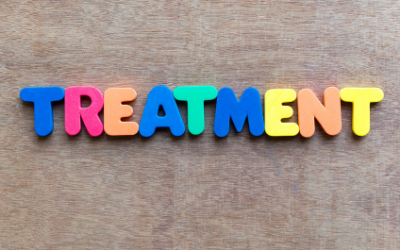
by R-IV PHTC | Apr 19, 2021 | Training
Opioid Use Disorder Treatment During COVID-19: Challenges and Opportunities
Year: 2021 | Competency/Strategic Skill: Program Planning | Priority Topic: Opioid Abuse | Setting: Online | Format: On-Demand | Sponsor: Emory University/Central Office
Overview:
This is a 90-minute recording of a live webinar held on April 28, 2021. This webinar is co-sponsored by the Injury Prevention Research Center at Emory.
The epidemic of opioid use and related harms has been exacerbated by the ongoing COVID-19 pandemic. Mitigation strategies for COVID-19 have led to disruption in the delivery of healthcare, increased social isolation, and rapid release of individuals from jails and prisons- all of which may increase the risk of overdose. Gaps in the continuum of care including access to mortality-reducing medication treatment for opioid use disorder have become more evident. In response, the federal government has made significant changes intended to provide more flexibility in how and where care is delivered for both methadone and buprenorphine treatment. Providers have welcomed these changes, and we will discuss several of these practice changes including how to utilize telemedicine and new long-acting injectable formulations to initiate and help retain patients in care.
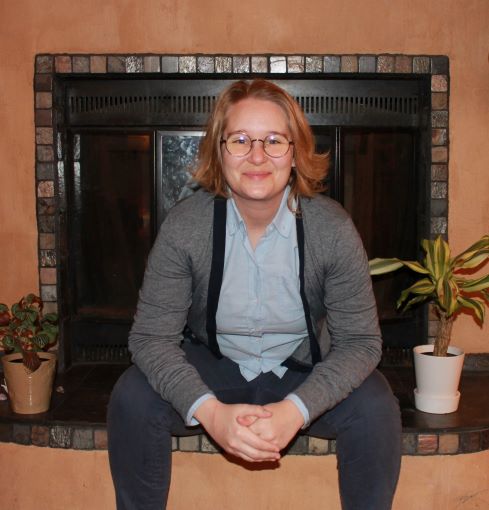
by R-IV PHTC | Apr 15, 2021 | Field Placement Stories
Christina Faulk was an MPH candidate at the Medical University of South Carolina when she served as a Region IV PHTC Pathways to Practice Scholar in the fall of 2020. As a research intern at the South Carolina Department of Health and Environmental Control (DHEC), Christina assessed childhood homelessness as a risk factor to opioid misuse and the role of effect modifiers as protective factors. Here is Christina’s reflection on her experience in her own words:
I chose this field placement because I knew that statistics was not one of my strengths and I wanted to build my skills in SAS and statistical analysis. My field placement gave me more experience in this subject matter and I was extremely fortunate to be able to work with the Director of Surveillance at DHEC, who is very knowledgeable in the field of Epidemiology, and Research and statistics.
I learned that with good public health research, a huge impact can be made for an entire population of people, which is quite profound. My mentor taught me patience, to believe in myself, and with dedication and effort anything can be accomplished. I have grown both personally and professionally during this field placement and feel more confident with large datasets and my ability to use statistical programing software to clean and analyze data.
This opportunity has confirmed my desire to work with data and research, specifically trauma and substance abuse research. I am extremely grateful and fortunate to have had this experience and encourage all public health graduate students to apply to the Pathways to Practice Scholars field placement.

by R-IV PHTC | Apr 12, 2021 | Training
Healer, Heal Thyself: Tools for Wellness and Self-Care during the COVID-19 Pandemic
Year: 2021 | Competency/Strategic Skill: Change Management | Priority Topic: Mental Health | Setting: Online | Format: On-Demand | Sponsor: Emory University/Central Office
Overview:
This is a 90-minute recording of a live webinar held on April 20, 2021.
During this webinar, we will focus on helping public health professionals develop tools needed to enhance their self-care and overall wellness. Approaching wellness from a holistic perspective, participants will leave with actionable items to develop a plan for self-care. The objective is to increase the investment in their personal wellness and self-care while becoming an example for those they serve. This webinar will teach them how to relieve the stresses they face in healthy ways and help them identify mental health resources and natural supports.

by R-IV PHTC | Apr 1, 2021 | Featured Training, Training
Using Message Framing Tools to Build and Sustain Cross-Sector Partnerships
Year: 2021 | Competency/Strategic Skill: Community and Partner Engagement | Priority Topic: N/A | Setting: Online | Format: On-demand | Sponsor: Emory University/Central Office
Overview:
This is a 30-minute self-paced online module. This is the second of three courses about Public Health Reaching Across Sectors (PHRASES).
This course focuses on the 10 PHRASES (Public Health Reaching Across Sectors) framing recommendations and four framing tools. The four framing tools included in the PHRASES Toolkit are frame elements, sample emails, “When You Say They Think” charts, and reframed answers to tough questions.
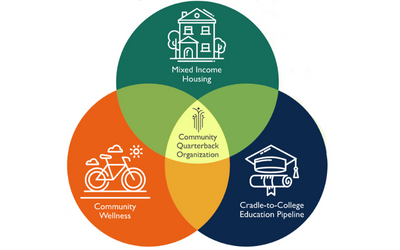
by R-IV PHTC | Mar 19, 2021 | Training
Purpose Built Communities and the Role of Public Health
Year: 2021 | Competency/Strategic Skill: Leadership and Systems Thinking | Priority Topic: N/A | Setting: On-Demand | Format: Live | Sponsor: Emory University/Central Office
Overview:
This is a 90-minute recording of a webinar held on March 31, 2021.
During this webinar, we will discuss the causes and impact of poverty as well as the role of public health in building cross-sectoral partnerships to improve social determinants of health. We will discuss the Purpose Built Community approach to building healthier communities and more equitable neighborhoods and the impact COVID-19 is having on the community development strategies.
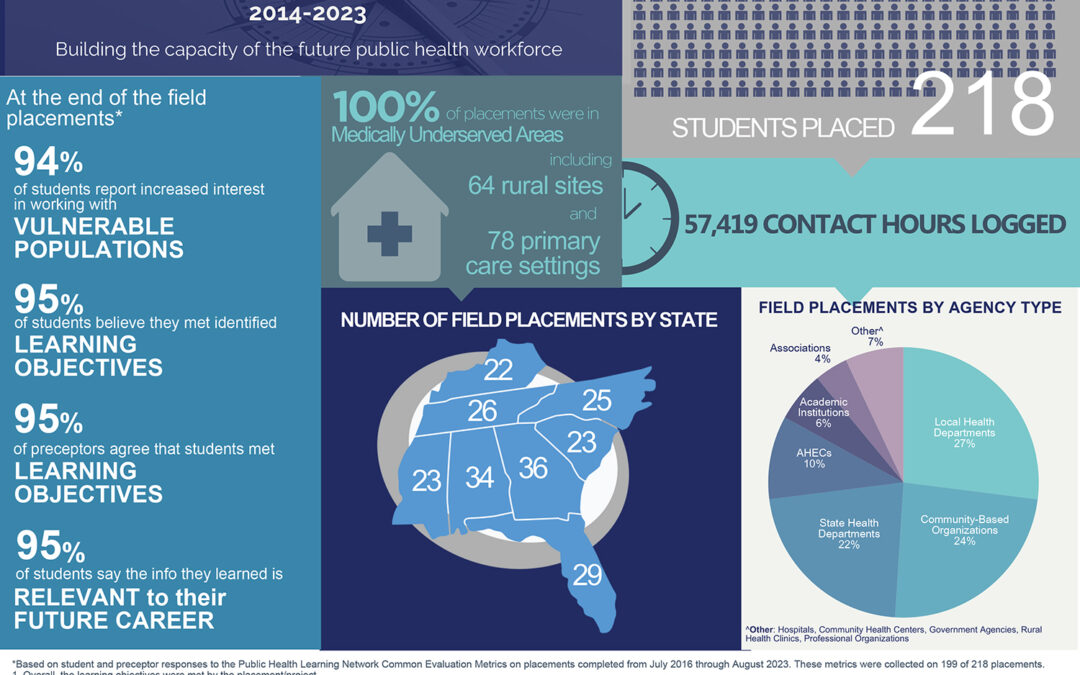
by R-IV PHTC | Mar 10, 2021 | News
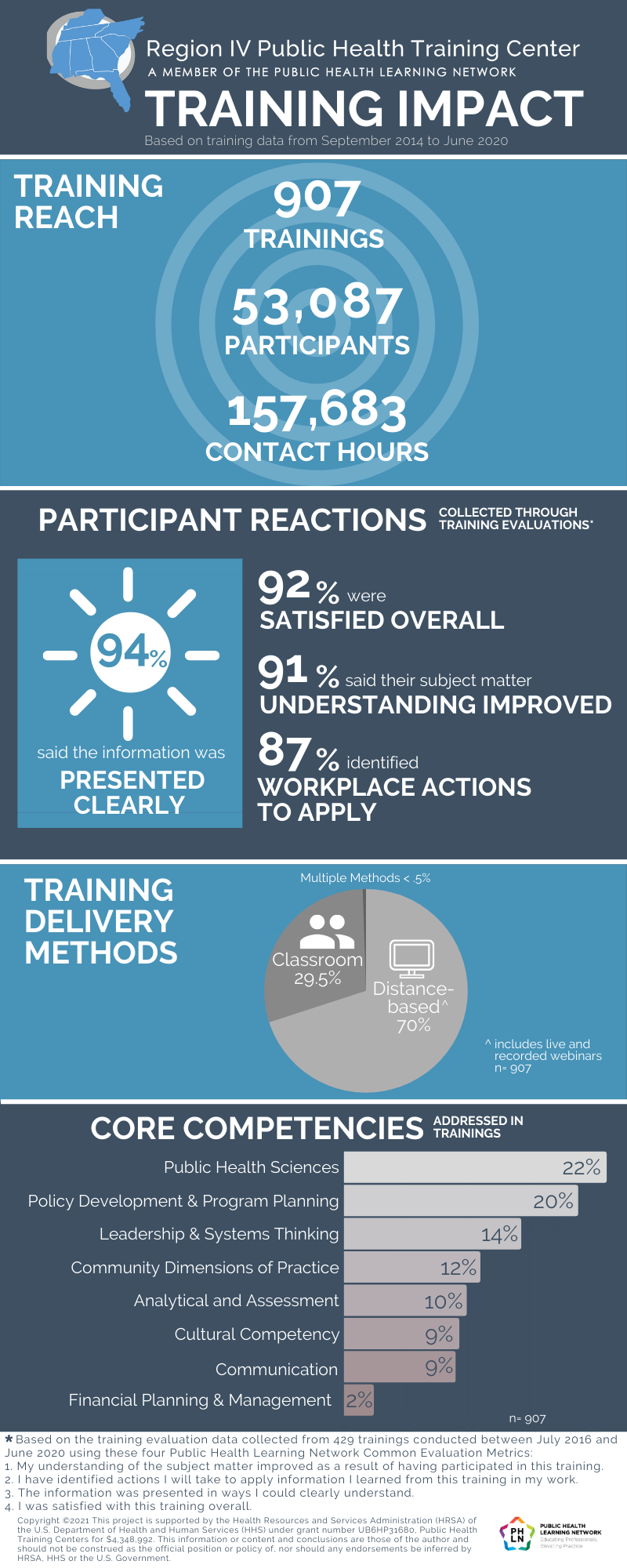
by R-IV PHTC | Mar 10, 2021 | News
The Region IV Public Health Training Center is committed to measuring the impact of our training programs on the public health workforce. The infographic below provides an overview of the reach and evaluation findings from trainings held between September 2014 and June 2020.

by R-IV PHTC | Mar 3, 2021 | Training
COVID-19 Pandemic and the Isolated Child: Risks and Stressors
Year: 2021 | Competency/Strategic Skill: Community and Partner Engagement| Priority Topic: Other Infectious Diseases | Setting: Online | Format: On-Demand | Sponsor: Emory University/Central Office
Overview:
This is a 90-minute recording of a webinar held on March 15, 2021.
During this webinar, we will address a variety of issues facing children and families during the pandemic including risks due to social isolation, virtual schooling, and the added stress on families. It will discuss how to help children adjust to being back to in-person school and stressors they may be experiencing. Resources will be provided to support children and families.

by R-IV PHTC | Feb 26, 2021 | Featured Training, Training
Leading Change in Informatics and Data Analysis
Year: 2021 | Competency/Strategic Skill: Data Analytics and Assessment| Priority Topic: N/A | Setting: Online | Format: On-Demand | Sponsor: Emory University/Central Office
Change is a constant in both our personal and professional lives. The idea that human beings naturally resist change is deeply ingrained into our culture and how we think about change. This course provides public health professionals with a foundation in change management and practical tools for utilizing formal change management for an informatics or data analytics project.
The entire training is expected to take 30 minutes to complete. There are no prerequisites.
The course contains three modules: the content module, a workbook, and an evaluation. After finishing all three modules, learners will earn a certificate of completion. When the certificate is available, learners will see a Certificate button on their dashboard.
Participants will need a broadband internet connection (Google Chrome or Mozilla Firefox are preferred browsers) and computer speakers. For technical support, please contact emoryphtc@emory.edu.

by R-IV PHTC | Feb 10, 2021 | Training
Bridging Mental Health and Public Health During COVID-19: A Town Hall
Year: 2021 | Competency/Strategic: Community and Partner Engagement | Priority Topic: Mental Health | Setting: Online | Format: On-Demand | Sponsor: Emory University/Central Office
Overview:
This is a 90-minute recording of a live webinar. The Southeast Mental Health Technology Transfer Center (MHTTC) co-sponsored this webinar.
The COVID-19 Pandemic has placed both mental health and public health workers on the front lines in an array of on-going stressful situations. As a result, mental health and public health agencies have had to innovate and adapt practices to support and care for their workforce and the populations they serve. This townhall event will feature mental health and public health agency representatives sharing insight on ways they have addressed COVID-19 while also supporting staff, the value of Mental Health-Public Health partnerships, and the related challenges they anticipate during the first half of 2021. Our panelists for this event include Dr. Audrey Arona, Chief Executive Officer and District Health Director for the Gwinnett-Newton-Rockdale County Health Department, and Jennifer Hibbard, Chief Executive Officer for Viewpoint Health.

by R-IV PHTC | Feb 2, 2021 | Training
COVID-19 Vaccine Hesitancy
Year: 2021 | Competency/Strategic Skill: Program Planning| Priority Topic: Other Infectious Diseases | Setting: Online | Format: Live | Sponsor: Medical University of South Carolina
Overview:
This is a live webinar scheduled for Friday, February 19, 2021 from 12pm-1pm ET.
The Medical University of South Carolina Department of Public Health Sciences is hosting a Public Health Training Web Series. This webinar will focus on COVID-19 vaccination hesitancy. The presenter will be Dr. Danielle Scheurer, Professor of Quality Management and Patient Safety at the Medical University of South Carolina.
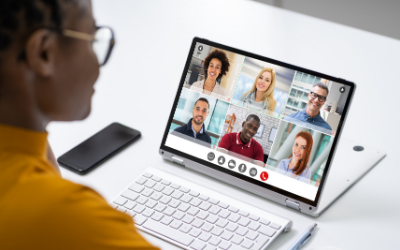
by R-IV PHTC | Jan 19, 2021 | Featured Training, Training
Dynamic Education And Learning (DEAL)
Year: 2022 | Competency/Strategic Skill: Program Planning| Priority Topic: N/A | Setting: Online | Format: On-Demand | Sponsor: Emory University/Central Office
Overview:
These are recordings of our 5-session series of 90-minute interactive online workshops offered every other week starting March 10, 2022 and ending May 5, 2022. All sessions were from 1–2:30 pm ET. Learners may choose to register for all workshops in the series or for individual sessions.
Dynamic Education And Learning (DEAL) is designed for public health professionals who want to elevate the quality of the distance-based trainings they develop and deliver. The series covers training planning, promotion, implementation and evaluation. Although much of the content is developed with distance-based training in mind, many concepts can also be applied in in-person trainings as well. Learners can register for any or all of the five sessions.
Session 1 Best Practices for Developing Quality Distance-based Training covers key terminology, e-learning standards, best practices and unique considerations for engaging in the distance-learning environment.
Session 2 Developing a Strong Foundation for Your Training covers how to define and learn about a target audience, develop learning objectives, create appealing titles and descriptions, and ways to promote training offerings.
Session 3 Introduction to Technology for Teaching and Assessment covers technology tools and the selection of appropriate strategies and technologies for teaching and assessment.
Session 4 How to Create Engaging Webinars and Interactive Slideshows covers webinars and interactive slideshows, and discusses the value of interaction in adult learning and how technology can be used to engage learners.
Session 5 Developing Training Evaluations covers methods of evaluation, Kirkpatrick’s levels of evaluation, effective survey questions, and strategies of data collection.

by R-IV PHTC | Jan 12, 2021 | Training
One RNA Virus is Enough! HIV Care in the Setting of the COVID Pandemic
Year: 2021 | Competency/Strategic Skill: Leadership and Systems Thinking | Priority Topic: HIV/AIDS | Setting: Online | Format: On-Demand | Sponsor: Emory University/Central Office
Overview:
This is 90-minute recording of a webinar held on January 21, 2021.
During this webinar, we will review how the COVID-19 pandemic has detrimentally affected HIV care and steps that have been taken to mitigate these effects.
by R-IV PHTC | Jan 11, 2021 | News
Today’s public health challenges, like climate change and COVID-19, are complex and require public health professionals to lead large-scale changes that no one person can solve alone. They also require an adaptive public health workforce with diverse knowledge and skills to respond to evolving issues, engage in collective learning, and intervene at organizational, community, and systems levels.
The Public Health Learning Network acknowledges the enormity of this task and has developed a new framework and other tools for doing the work. You can find it all in their new resource, Creating a Learning Agenda for Systems Change: A Toolkit for Building an Adaptive Public Health Workforce.
Recognizing that individual skill building is important but often insufficient for supporting an adaptive workforce, the toolkit helps leaders think beyond training for individual competencies and instead facilitate organizational learning in response to community health needs. The framework embedded in the toolkit helps workforce specialists understand and define public health problems, align the problem with the type of change needed to address it—like increasing knowledge or addressing social norms—and recommend complementary learning strategies to tackle the problem with a vision of addressing systems change.
The toolkit also includes problem-solving tools for moving these concepts into action. The rapid self-assessment helps organizations identify community challenges and examine their current learning state to address them. The discussion guide helps leaders facilitate conversations as they move through each step of the framework. And the learning approach planning tool assists in designing learning opportunities that best fit the community challenge and desired level of impact.
“We want public health leaders and their partners to use this toolkit as a catalyst for their design thinking and planning to change the way their organizations approach learning. This is critical for building learning strategies that can facilitate more ongoing innovation in today’s public health workforce,” said Christina Welter, DrPH, MPH, lead author of the toolkit and associate director for the Policy, Practice, and Prevention Research Center at the University of Illinois at Chicago School of Public Health.
Are you ready to take your organization’s training and learning to the next level? Visit the Public Health Learning Agenda and download a copy of the toolkit today.
Interested and want to know more before you begin? View the on-demand kick-off webinar to hear more about how these concepts and tools fit together and about future pilot testing for the toolkit.
The Public Health Learning Network is a national coalition of 10 Regional Public Health Training Centers and their partners organized to meet public health workforce development needs.

by R-IV PHTC | Jan 5, 2021 | Training
Impact of Child Sexual Abuse: Empowering Prevention through Education
Year: 2021 | Competency/Strategic Skill: Program Planning | Priority Topic: Mental Health | Setting: Online | Format: On-Demand | Sponsor: Emory University/Central Office
Overview:
This is a 90-minute recording of a webinar held on January 11, 2021.
Child sexual abuse prevention starts with knowledge and awareness of the problem. This webinar provides professionals who work with children and families with an overview of the issue as well as tools and strategies to create safer environments for children in both a professional and personal setting. The webinar will cover practical actions adults can take to reduce instances of child sexual abuse in their organizations, families, and communities, and will give participants information about evidence-informed training programs available to deepen knowledge and enhance skill building to prepare adults to speak up and prevent sex abuse.
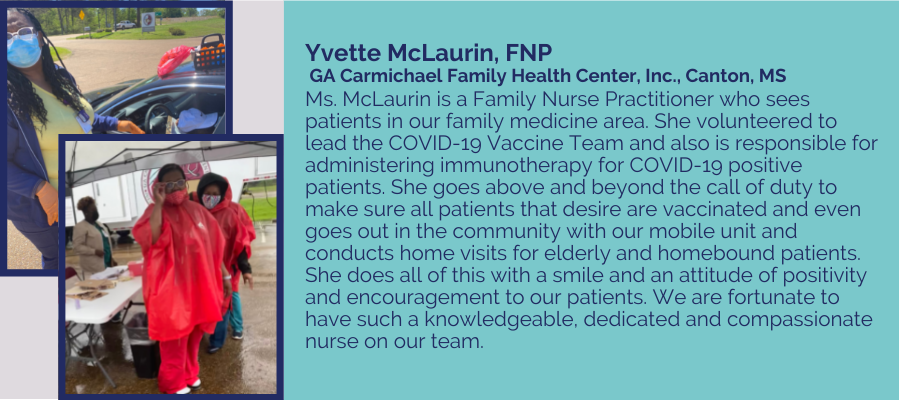
by R-IV PHTC | Dec 15, 2020 | Archive, News
The COVID-19 pandemic has heightened both awareness and scrutiny of the field of public health. Public health professionals have been tasked with responding to the virus in a highly politically charged environment, while also continuing to provide regular programs and services in the challenging circumstances of a pandemic. As a county health department Community Coalition Coordinator explained:
Our health department is handling all things COVID for the county—testing; providing guidance to schools, businesses, employers, agencies, health care providers and the public; investigating and enforcing of state regulations; contact tracing; providing lab results to EVERY single person who takes a COVID test; arranging and providing a multiplicity of testing events that change weekly to meet the current need; and monitoring and assisting people placed in quarantine/isolation to make certain they have what they need and do not violate the order. We also provide shelter and housing and food for people who have no safe place to quarantine or isolate. As employees of the health department we are considered first responders and throughout this crisis are constantly being pulled away from our regular work. I have so much work to do and so very little time. Just because COVID-19 came to town does not mean all of the other health problems went away.
In this new photo blog, Portraits of Public Health, the Region IV Public Health Training Center seeks to highlight and appreciate the folks who have been and continue to do the hard work of public health. To nominate a public health professional to be included, please use this form. Priority will be given to nominees from Region IV.

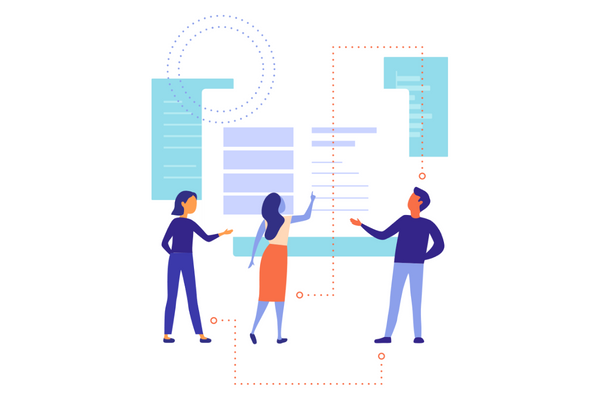
by R-IV PHTC | Dec 1, 2020 | Featured Training, Training
An Overview of Public Health Reaching Across Sectors
Year: 2020 | Competency/Strategic Skill: Community and Partner Engagement | Priority Topic: N/A | Setting: online | Format: On-Demand | Sponsor: Emory University/Central Office
Overview:
This is a 30-minute online course. This is the second of three courses about Public Health Reaching Across Sectors (PHRASES).
This online course is an overview of Public Health Reaching Across Sectors or PHRASES, a compilation of communication strategies and tools for public health professionals to use to foster a better understanding of public health and the greater willingness of other sectors to engage in cross-sector partnerships. It will provide an introduction to how productive framing and messaging can improve partnerships and overall health outcomes, and an overview of the tools and strategies PHRASES provides to improve communication to other sectors.
PHRASES is a joint project of the de Beaumont Foundation and the Aspen Institute’s Health, Medicine and Society Program.

by R-IV PHTC | Oct 12, 2020 | Training
Communicate Effectively While Wearing a Mask and in Virtual Environments
Year: 2020 | Competency/Strategic Skill: Communication | Priority Topic: Other Infectious Diseases | Setting: Online | Format: On-demand | Sponsor: Emory University/Central Office
Overview:
This is a 90-minute recording of a webinar held on October 26, 2020.
As we begin discussions of re-opening the nation, we are all faced with the reality of walking back into a world that is vastly different than just a few months ago. Perhaps most noticeably, many public places have initiated mask policies. In a recent study completed in Hong Kong, it was determined that wearing a mask can decrease infection by 75%. In short, by wearing a cloth mask you significantly reduce your own risk of exposure to and spread of virus containing particles. Wearing a mask can be an effective protective measure in preventing community spread of COVID-19, however, we can’t ignore its effects on day to day life. Masks are annoying, uncomfortable, and inconvenient, especially when you need to vocally communicate while wearing one. The workforce is also moving towards virtual platforms in with thunderous acceleration. Virtual platforms also create challenges for communication from home-office ergonomic blunders to prolonged conference calls with less than superb equipment.
This webinar is purposed to equip a diverse, public-facing group of professionals with information and skills necessary to overcome these communication barriers with excellence. Topic areas will include the anatomy and physiology of communication, purposeful enhancement of communication techniques to overcome physical and digital barriers, and recovery techniques to combat work and life related vocal fatigue. The webinar will be presented by Nathaniel Sundholm, MS, CCC-LSP, of the Emory Voice Center.
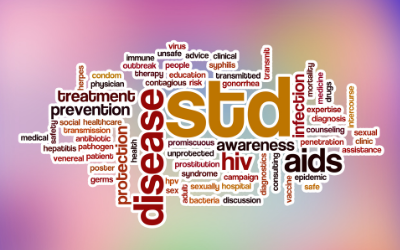
by R-IV PHTC | Oct 8, 2020 | Training
Stemming the Rising Tide of STDs through Partnerships and Comprehensive Strategies
Year: 2020 | Competency/Strategic Skill: Community and Partner Engagement | Priority Topic: Other Infectious Diseases | Setting: Online | Format: On-demand | Sponsor: Emory University/Central Office
Overview:
This is a 90-minute recording of a webinar held on Monday, October 19.
This presentation will cover the rising rates of STDs in the United States, drivers of these rates and innovative approaches to mitigate these trends. The role of STDs in Ending the HIV Epidemic (EHE) and the impact of COVID-19 on STD trends will also be discussed. The webinar will be presented by Gail Bolan, MD, Director of the Division of STD Prevention at the Centers for Disease Control and Prevention.
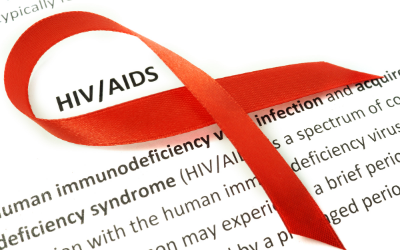
by R-IV PHTC | Oct 2, 2020 | Training
HIV/AIDS in South Carolina
Year: 2020 | Competency/Strategic Skill: Data Analytics and Assessment | Priority Topic: HIV/AIDS | Setting: Online | Format: Live | Sponsor: Medical University of South Carolina
Overview:
This is a live webinar scheduled for Friday, November 13, 2020 at 12:00pm ET.
The webinar will be presented by Virgina Fonner, PhD, MPH, Assistant Professor of the Division of Global and Community Health at the Medical University of South Carolina.
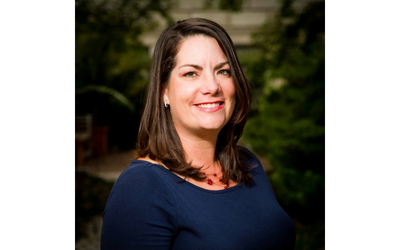
by R-IV PHTC | Sep 24, 2020 | Training
Making Sense of COVID-19 Data
Year: 2020 | Competency/Strategic Skill: Data Analytics and Assessment | Priority Topic: Other Infectious Disease | Setting: Online | Format: On-demand | Sponsor: Emory University/Central Office
Overview:
This webinar with Amber Schmidtke, PhD, was held on September 30, 2020.
Public health data are often imperfect, which means we have to rely on multiple data streams to get a clearer picture of the present situation. Proper understanding of data with context is the antidote to disinformation. In this webinar, we’ll go through how to find and evaluate data, identifying the merits and challenges of different data sets, to make sure we have the right data to answer our questions.

by R-IV PHTC | Sep 15, 2020 | Training
Ending the Silence for Families
Year: 2020 | Competency/Strategic Skill: Community and Partner Engagement | Priority Topic: Mental Health | Setting: Online | Format: Live | Sponsor: Emory University/Central Office
Overview:
This is a live webinar scheduled for September 23, 2020 from 10-11am ET. This webinar is co-sponsored by the Injury Prevention Research Center at Emory.
Join us as we discuss mental illness warning signs, facts and statistics. Guest presenters Annie Connor and Lauren Paul are with NAMI (National Alliance on Mental Illness) Georgia.

by R-IV PHTC | Aug 26, 2020 | Training
Unexplained Pediatric Deaths: Investigation, Certification, and Family Needs: Procedural Guidance and Key Considerations Developed by the National Association of Medical Examiner’s Panel on Sudden Unexpected Death in Pediatrics
Year: 2020 | Competency/Strategic Skill: Data Analytics and Assessment | Priority Topic: Other Infectious Disease | Setting: Online | Format: On-Demand | Sponsor: Alabama Public Health Training Network, Alabama Department of Public Health
Overview:
This is a 60-minute recording of a webinar held on September 4, 2020.
The workshop focuses on the medicolegal investigation of sudden, unexpected pediatric deaths, focusing on those deaths which remain incompletely understood or entirely unexplained. It discusses the evolution of our understanding and practice in the area of sudden, unexpected pediatric death investigation. Procedural guidance for investigation, certification and reporting, and key considerations for prevention and working with family members and other professional team members are provided.
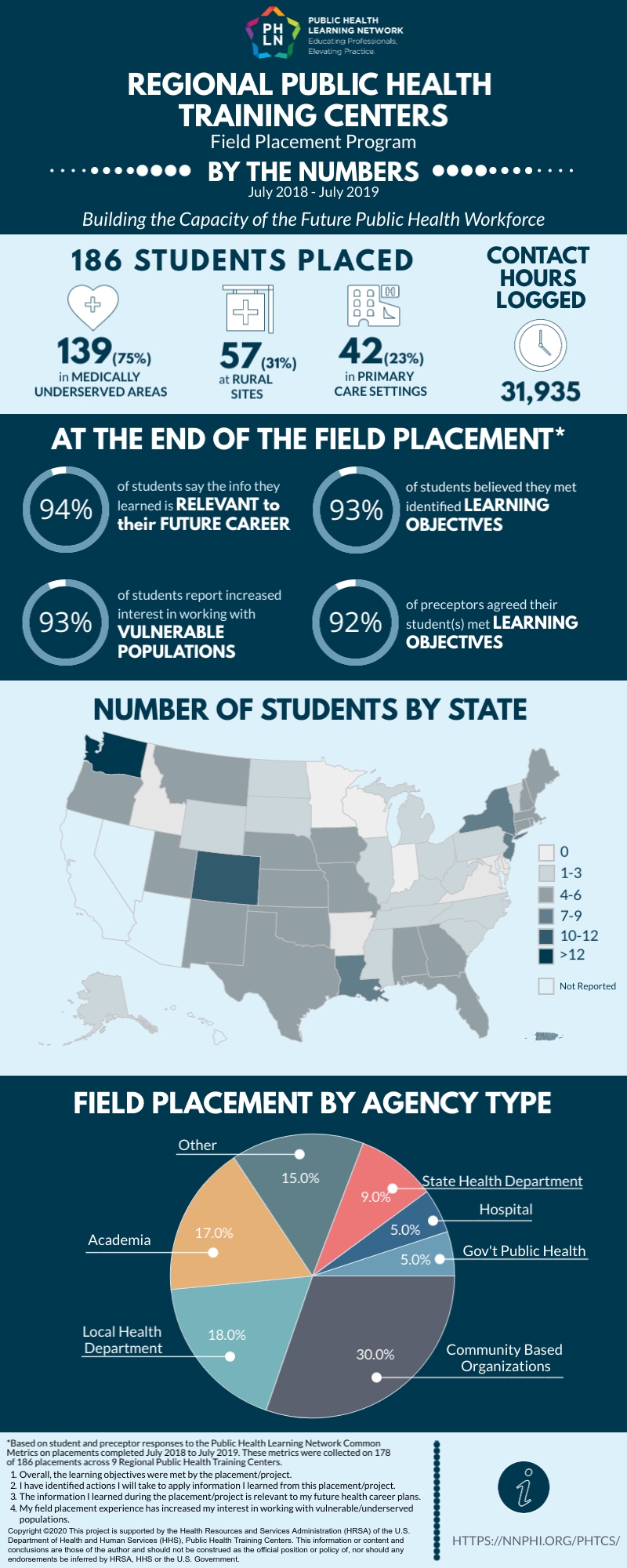
by R-IV PHTC | Aug 26, 2020 | Archive, News
When you participate in a training with the Region IV Public Health Training Center, you become a key part of a national network (the Public Health Learning Network, or PHLN) of ten regional Public Health Training Centers, each funded by the Health Resources and Services Administration to strengthen the public health workforce through education and training.
The PHLN is committed to measuring and communicating the influence of our programming. Two new infographics (below) highlight the collective impact and value of the PHTCs activities at a glance. The compiled data highlight the tremendous effort of the PHTCs in designing trainings that clearly communicate relevant public health information in such a way that participants are not only satisfied with the training, but are also able to learn from the trainings and identify actions they can take in their workplace. Likewise, across all regional field placements, the strength and impact of the PHTC field placement program is evident.























